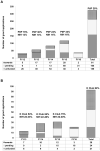Multidisciplinary Mentoring Programs to Enhance Junior Faculty Research Grant Success
- PMID: 28272113
- PMCID: PMC5589470
- DOI: 10.1097/ACM.0000000000001620
Multidisciplinary Mentoring Programs to Enhance Junior Faculty Research Grant Success
Abstract
Problem: Junior faculty face challenges in establishing independent research careers. Declining funding combined with a shift to multidisciplinary, collaborative science necessitates new mentorship models and enhanced institutional support.
Approach: Two multidisciplinary mentorship programs to promote grant success for junior faculty were established at the Duke University School of Medicine beginning in 2011. These four-month programs-the Path to Independence Program (PtIP) for National Institutes of Health (NIH) R applicants and the K Club for NIH K applicants-use multiple senior faculty mentors and professional grant-writing staff to provide a 20-hour joint curriculum comprising a series of lectures, hands-on workshops, career development counseling, peer groups, and an internal study section. In March 2016, the authors analyzed the success rate for all NIH grants submitted by participants since program enrollment. In a 2015 postprogram survey, participants rated their feelings of support and competency across six skill factors.
Outcomes: From October 2011 to March 2016, the programs engaged 265 senior faculty mentors, 145 PtIP participants, and 138 K Club participants. Success rates for NIH grant applications were 28% (61 awards/220 decisions) for PtIP participants-an increase over the 2010 Duke University junior faculty baseline of 11%-and 64% (38/59) for K Club participants. Respondents reported significantly increased feelings of support and self-ratings for each competency post program.
Next steps: The authors plan to expand the breadth of both the mentorship pool and faculty served. Broad implementation of similar programs elsewhere could bolster success, satisfaction, and retention of junior faculty investigators.
Figures








Similar articles
-
Independent investigator incubator (I3): a comprehensive mentorship program to jumpstart productive research careers for junior faculty.BMC Med Educ. 2018 Aug 6;18(1):186. doi: 10.1186/s12909-018-1290-3. BMC Med Educ. 2018. PMID: 30081899 Free PMC article.
-
National Heart, Lung, and Blood Institute Workshop Summary: Enhancing Opportunities for Training and Retention of a Diverse Biomedical Workforce.Ann Am Thorac Soc. 2016 Apr;13(4):562-7. doi: 10.1513/AnnalsATS.201509-624OT. Ann Am Thorac Soc. 2016. PMID: 27058184 Free PMC article.
-
The Proposal Preparation Program: A Group Mentoring, Faculty Development Model to Facilitate the Submission and Funding of NIH Grant Applications.Acad Med. 2022 Jan 1;97(1):53-61. doi: 10.1097/ACM.0000000000004359. Acad Med. 2022. PMID: 34380935
-
The power of junior faculty mentoring committees.J Cell Physiol. 2024 Jul;239(7):e31360. doi: 10.1002/jcp.31360. Epub 2024 Jul 4. J Cell Physiol. 2024. PMID: 38962842 Free PMC article. Review.
-
Mentoring strategies to support diversity in research-focused junior faculty: A scoping review.J Clin Transl Sci. 2022 Oct 6;7(1):e21. doi: 10.1017/cts.2022.474. eCollection 2023. J Clin Transl Sci. 2022. PMID: 36755542 Free PMC article.
Cited by
-
Mentorship of Underrepresented Physicians and Trainees in Academic Medicine: a Systematic Review.J Gen Intern Med. 2021 Apr;36(4):1023-1034. doi: 10.1007/s11606-020-06478-7. Epub 2021 Feb 2. J Gen Intern Med. 2021. PMID: 33532959 Free PMC article.
-
A CTSA-based consultation service to advance research on special and underserved populations.J Clin Transl Sci. 2020 Jan 16;4(4):271-278. doi: 10.1017/cts.2020.6. J Clin Transl Sci. 2020. PMID: 33244406 Free PMC article.
-
Institutional and Faculty Partnerships to Promote Learner Preparedness for Health Professions Education.J Racial Ethn Health Disparities. 2021 Oct;8(5):1315-1321. doi: 10.1007/s40615-020-00893-6. Epub 2020 Oct 13. J Racial Ethn Health Disparities. 2021. PMID: 33051747 Free PMC article.
-
Impact of the Oklahoma IDeA Network of Biomedical Research Excellence research support and mentoring program for early-stage faculty.Adv Physiol Educ. 2022 Sep 1;46(3):443-452. doi: 10.1152/advan.00075.2021. Epub 2022 Jun 6. Adv Physiol Educ. 2022. PMID: 35658613 Free PMC article.
-
A Mentoring Network for Diversity in Dental, Oral, and Craniofacial Research.J Dent Res. 2024 Nov;103(12):1167-1172. doi: 10.1177/00220345241265664. Epub 2024 Sep 15. J Dent Res. 2024. PMID: 39279238
References
-
- Wuchty S, Jones BF, Uzzi B. The increasing dominance of teams in production of knowledge. Science. 2007;316(5827):1036–1039. - PubMed
-
- National Institutes of Health NIH Data Book. 2015 https://report.nih.gov/nihdatabook/index.aspx. Accessed August 27, 2016.
Publication types
MeSH terms
Grants and funding
LinkOut - more resources
Full Text Sources
Other Literature Sources

